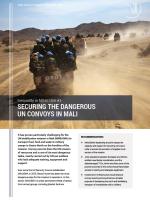The challenges of supplying the frontline in Mali
Peacekeepers in the UN stabilization mission in Mali (MINUSMA) operate under very difficult conditions, especially in the outskirts of the mission. The recent jihadist attack on a military base in Gao in northern Mali, killing 60 and wounding more than 100, is the latest example of how dangerous working in this part of the country is.
This policy brief, based on fieldwork in Mali, analyses the challenges to the mission of supplying fuel, food and water to these areas. In doing so, it describes the inequality that exists between African and non-African soldiers.
In contrast to their European colleagues, African soldiers are permanently deployed in the most dangerous areas of the mission. More often than not, African soldiers in charge of securing convoys in and out of these areas do not have adequate support, training and equipment to operate. The challenges to ensure supply lines seriously drains MINUSMA’s resources and affects its ability to perform other tasks that are vital for the peace process in Mali.
The policy brief is one of the outputs of a project that has explored the plight of African peacekeepers in MINUSMA. The project is a collaborative effort between DIIS and the Royal Danish Defence College. It is funded by the Danish Ministry of Defence.
Three policy briefs and a report will be launched on 27 Januaryat a seminar that explores the future role of the UN in conflict zones around the world(the seminar is in Danish).
DIIS Experts




